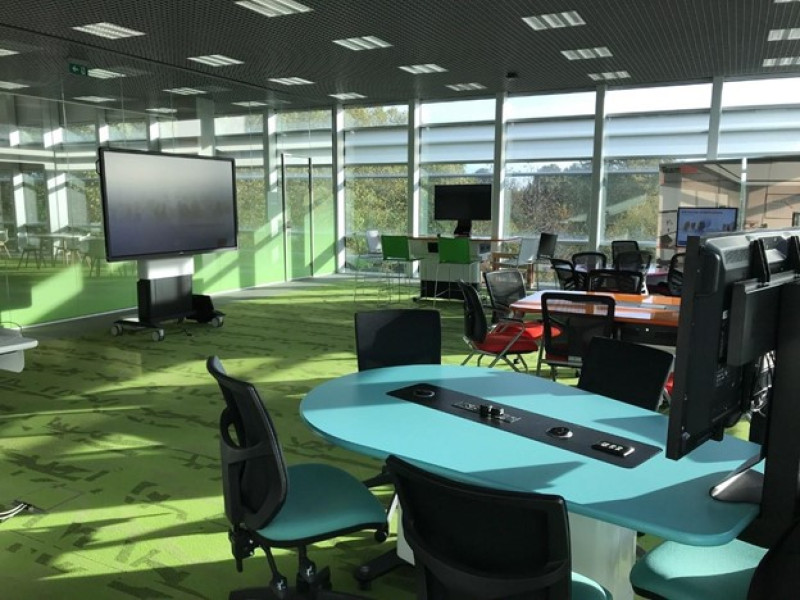Learning spaces properly support activational education and help students develop 21st century skills. The physical spaces offer extensive didactic opportunities, stimulate learning processes and are in some cases rich in technology. But how do you develop learning spaces? How do you ensure that they are used to their full potential?
Results
Learning spaces are attracting more and more attention around the world. In the Netherlands, many institutions are working on small-scale pilots and there is a clear need to exchange knowledge. SURF wants to provide more insight into the design of educational spaces for blended education.
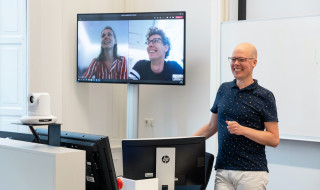
“De inrichting van de onderwijsruimtes van de universiteit zat me steeds meer in de weg. Mijn stijl van doceren vragen om veel interactie en veel minder om eenrichtingsverkeer. Daar moest ik iets mee.” Jasper van Winden, docent aan de Universiteit Utrecht vertelt gepassioneerd over zijn initiatieven om het onderwijs interactiever te maken.
Publication Active learning spaces: lessons learned in the US
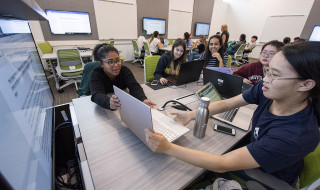
In this publication, you will read the most important insights from the trip and what active learning spaces can mean for Dutch higher education.
6 lessons learned
- Put students at the centre when developing active learning spaces.
- Use active learning spaces to facilitate active teaching.
- Use technology to constantly develop active learning spaces.
- Good coaching and training of instructors are necessary to optimise the didactic use of active learning spaces.
- Ensure institutional-wide support for successful implementation of active learning spaces.
- Cross-institutional collaboration pays off: learn from one another instead of reinventing the wheel.
Research into technology-rich learning spaces in Dutch higher education
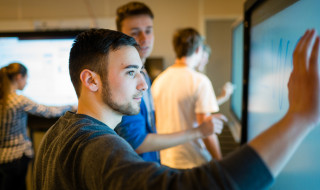
This publication presents the results, conclusions and recommendations of a study into the status of technology-rich learning spaces in Dutch higher education.
Multi-location learning in practice
Two practical examples from KU Leuven and 4TU to show what is possible with multi-location learning. Multi-location learning is following education from different locations simultaneously by means of a live connection.
Study trip to ELI
See the experiences of a Dutch delegation who went to the ELI conference.
Study trip to ELI 2020
The highlight of this study trip was the visit to Oregon State University. When setting up their Learning Innovation Centre, they focused on their educational vision. This resulted, for example, in round classrooms. Read the report of the study trip (in Dutch).
Also read the extensive report on the Oregon State University (in Dutch) with learning spaces as the focus.
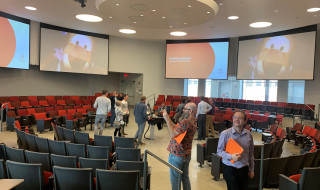
Round lecture hall in the LINC at Oregon State University. Photo: Michel Jansen
Stakeholder analysis
The SIG's publication Stakeholder analysis (PDF, in Dutch) offers tools to map out initial stakeholders. Use it as a tool to achieve your goal: involving the right stakeholders in the right way and at the right time.
Increasing Teacher Engagement for Innovative Learning Spaces
The SIG Learning Spaces has produced a document that can help you to increase teacher engagement for innovative education spaces.
Artikelen van de SURF Community Learning Spaces
Op de Communities-pagina van de SIG Learning Spaces verzamelt de SIG verslagen van events, links naar onderzoeken en andere bronnen. Hier volgen een aantal interessante artikelen.
Onderzoek
- Literatuuronderzoek synchroon hybride leren: Synchroon leren is relatief nieuw. Daarom zijn er maar weinig onderzoeken die het gebruik en de effectiviteit ervan hebben onderzocht. Dit onderzoek van de KU Leuven uit 2019 heeft het beschikbare wereldwijde onderzoek samengebracht tot een overzicht met betrekking tot de voordelen, uitdagingen en huidige ontwerpprincipes om synchroon hybride leren op te zetten.
- TECOLrapport KU Leuven: De KU Leuven is sinds 2016 bezig met een breed project waarbij meerdere innovatieve onderwijsruimtes zijn ingericht en waarbij expertise in het onderwijs wordt opgebouwd. Dit is het rapport van maart 2020 met al hun bevindingen.
- Onderzoekspublicatie van de KU Leuven: Onderzoek naar Hybrid Virtual Classrooms, gepubliceerd in 2020 bij Elsevier in Computers and Education.
- Teambase learning space van het AMC: Onderwijskundig onderzoek door Jet Bierman (Universiteit van Amsterdam ) naar de teambased learning space van het AMC. Dit onderzoek geeft inzicht in hoe de gebruikers van de ruimte, de studenten en docenten, zich gedragen, welke rol de onderwijsruimte heeft in actief leren en hoe de technologie zich daartoe verhoudt.
- Onderzoek naar onderwijsruimte van de toekomst (Deel 1 en Deel 2): De conclusie van het onderzoek was dat de kwaliteit van het onderwijs verbeterd wordt door de transitie naar active learning aan te jagen. In deze blogpost pitchen we vier concepten die hieraan bij zouden moeten dragen. Sommige concepten zijn niet active learning-specifiek, maar we geloven wel dat ze enorm kunnen bijdragen binnen een active learning setting.
Voorbeelden van ruimtes
- Boek over ateliers NHL Stenden: In 2019 is het boek over de ateliers van NHL Stenden gepubliceerd. Het geeft een overzicht van alle ateliers binnen de hogeschool en gaat in op het ontwerpproces van een atelier, hoe de ateliers zich van elkaar onderscheiden en welke plek het atelier inneemt in het onderwijsconcept DBE (Design Based Education).
Verslagen van studiedagen, congressen en Lezingen
- Verslag van Making Learning Spaces Work (Universiteit Utrecht)
- Studiereis 2020 SURF (USA; Oregon University)
- Verslag van openingsdag van het PULS onderwijsgebouw TU Delft
- Impressie bezoek Adam Finkelstein aan Nederland (2019)
- Summit Innovative learning spaces Barcelona (2019)
- Online conferentie ELI (2020)
- Verslagen van verslagen van 3 webinars van Indiana University met tips om zelf aan de slag te gaan(1, 2, 3)
